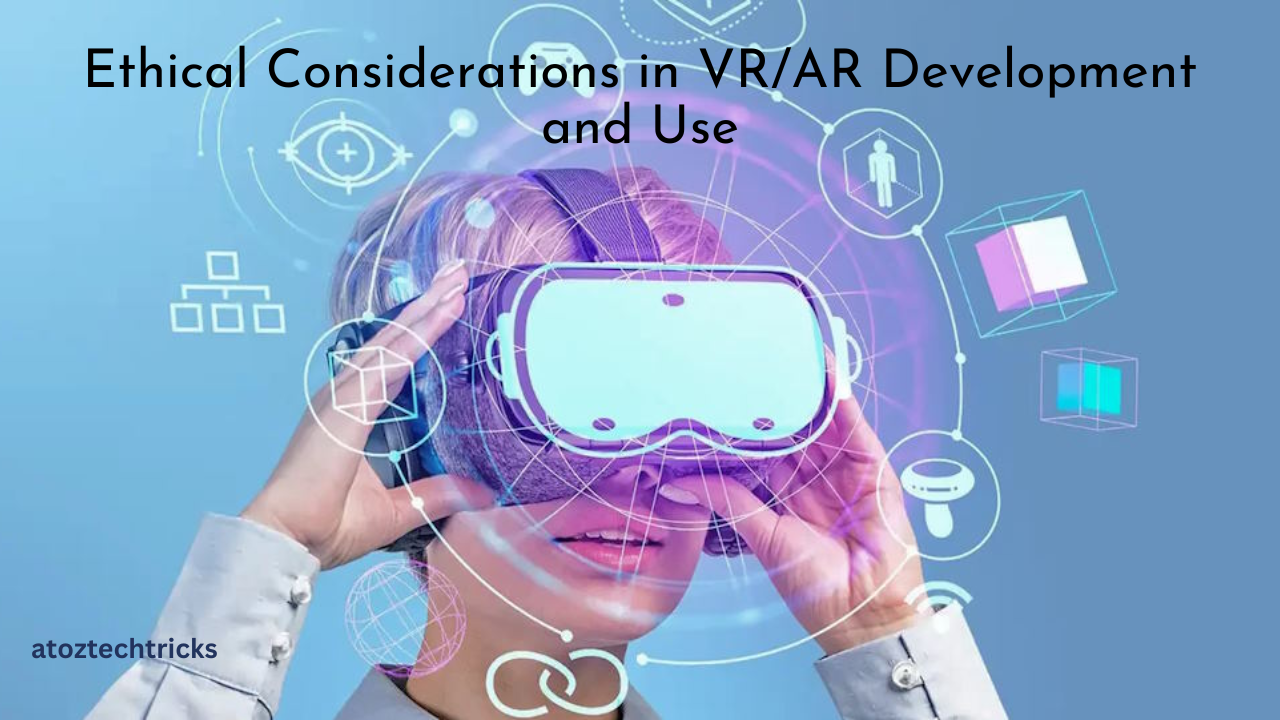Ethical Considerations in VR/AR Development and Use
Virtual Reality (VR) and Augmented Reality (AR) have revolutionized the way we interact with digital content, creating immersive experiences that blur the lines between the real and virtual worlds. As these technologies continue to advance and become more integrated into various aspects of our lives, ethical considerations have become increasingly critical. This comprehensive guide explores the ethical dimensions of VR and AR development and use, focusing on privacy, consent, accessibility, and societal impacts.
1. Privacy and Data Security
1.1 The Scope of Data Collection
VR and AR systems collect a significant amount of data, including personal information, behavioural patterns, and biometric data. This data collection often goes beyond what traditional digital platforms gather, as VR and AR experiences can track physical movements, facial expressions, and even physiological responses. This raises important questions about how this data is stored, used, and protected.
1.2 Risks of Data Misuse
The potential misuse of data collected through VR and AR systems is a significant concern. Personal data can be exploited for targeted advertising, manipulation, or even identity theft. In the worst cases, sensitive information could be used to create detailed psychological profiles, leading to privacy violations or psychological harm.
1.3 Ensuring Data Protection
Developers and companies must implement robust data protection measures. This includes encrypting data, ensuring secure storage, and providing users with clear information about what data is collected and how it will be used. Transparency is crucial in building trust and ensuring users can make informed decisions about their data.
Internet of Things (IoT): Revolutionizing Connectivity and Innovation
2. Informed Consent
2.1 Understanding User Consent
Informed consent is a fundamental principle in ethical technology use. For VR and AR, this means users must be fully aware of what they are agreeing to when they engage with these technologies. This includes understanding the data collection practices, the nature of the virtual environment, and any potential risks involved.
2.2 Challenges in VR/AR Consent
Obtaining genuine informed consent in VR/AR environments can be challenging. The immersive nature of these technologies can blur the lines between reality and virtuality, making it harder for users to fully understand the implications of their interactions. Developers need to find ways to ensure that consent is communicated and understood.
2.3 Best Practices for Consent
To address consent challenges, developers should adopt best practices such as providing clear, concise information about data use and potential risks, implementing easy-to-navigate consent forms, and offering users the ability to withdraw consent at any time. Regular updates and reminders about consent policies can also help maintain transparency.
3. Accessibility and Inclusivity
3.1 Ensuring Accessibility
As VR and AR technologies become more prevalent, ensuring accessibility for all users is essential. This includes considering individuals with disabilities, older adults, and those with limited technological proficiency. Accessibility features, such as adjustable interfaces, voice controls, and alternative input methods, are crucial in making these technologies inclusive.
3.2 Addressing Digital Divide
The digital divide is a significant issue in technology adoption, and VR/AR is no exception. Not everyone has equal access to the necessary hardware or high-speed internet required for these experiences. Developers and policymakers must work together to address these disparities and ensure that VR/AR benefits are accessible to all, regardless of socioeconomic status.
3.3 Designing for Inclusivity
Inclusivity in VR/AR design involves creating experiences that cater to diverse user needs and preferences. This includes considering cultural differences, designing for various physical abilities, and ensuring that content is representative and respectful of different communities. By adopting inclusive design principles, developers can create more equitable and engaging experiences.
4. Psychological and Social Impacts
4.1 Psychological Effects
VR and AR have the potential to significantly impact users’ psychological well-being. The immersive nature of these technologies can lead to disorientation, anxiety, or even addiction. Developers must be aware of these potential effects and take steps to mitigate them, such as implementing features to prevent overuse and providing users with tools to manage their virtual experiences.
4.2 Social Implications
The social implications of VR and AR are also noteworthy. These technologies can alter social interactions, both positively and negatively. While VR and AR can facilitate social connections and create new ways to collaborate, they can also lead to social isolation or exacerbate existing issues like cyberbullying. Developers need to consider these impacts and create features that promote positive social interactions.
4.3 Addressing Psychological and Social Concerns
To address psychological and social concerns, developers should conduct thorough testing and research to understand the potential effects of their technologies. Providing resources for mental health support, implementing features to manage virtual well-being, and promoting healthy usage practices are essential steps in mitigating negative impacts.
Implementing IoT in Business Operations: A Comprehensive Guide
5. Ethical Content Creation
5.1 Content Responsibility
Content creation in VR and AR comes with ethical responsibilities. Developers must consider the potential impact of their content on users and society. This includes avoiding harmful stereotypes, ensuring that content is not misleading or deceptive, and being mindful of the potential for content to influence behaviour negatively.
5.2 Addressing Content Moderation
Content moderation in VR and AR environments can be challenging due to the immersive and interactive nature of these technologies. Developers must implement effective moderation practices to prevent the spread of harmful content, harassment, or inappropriate behaviour within virtual spaces. This includes creating clear guidelines, using automated tools to detect inappropriate content, and providing mechanisms for users to report issues.
5.3 Promoting Positive Experiences
To promote positive experiences, developers should focus on creating content that is educational, inclusive, and respectful. By prioritizing ethical content creation and moderation practices, developers can contribute to a healthier and more constructive VR/AR ecosystem.
6. Environmental Impact
6.1 Environmental Footprint of VR/AR
The production and use of VR and AR technologies have environmental implications. The manufacturing of hardware, energy consumption during use, and electronic waste generated by outdated devices contribute to the environmental footprint of these technologies. Developers and manufacturers must consider these impacts and work towards more sustainable practices.
6.2 Sustainable Development Practices
Sustainable development practices in VR and AR can include using eco-friendly materials, designing energy-efficient devices, and implementing recycling programs for electronic waste. By adopting these practices, the industry can reduce its environmental impact and promote more sustainable technology use.
6.3 Encouraging Eco-Friendly Choices
Developers can also encourage eco-friendly choices by providing users with information about the environmental impact of their devices and offering options for reducing energy consumption. Additionally, promoting virtual experiences that reduce the need for physical travel can help mitigate the environmental impact of VR/AR technologies.
7. Regulatory and Policy Considerations
7.1 Navigating Regulatory Frameworks
The rapid development of VR and AR technologies often outpaces existing regulatory frameworks. This creates challenges in ensuring that these technologies are used ethically and responsibly. Policymakers and regulators need to work closely with industry stakeholders to develop and implement regulations that address privacy, security, and ethical concerns.
7.2 Advocating for Ethical Standards
Developers and industry leaders can advocate for ethical standards by participating in discussions about regulations and best practices. By contributing to the development of industry guidelines and standards, they can help ensure that VR and AR technologies are used in ways that align with ethical principles and societal values.
7.3 Future of VR/AR Regulation
As VR and AR technologies continue to evolve, regulatory frameworks will need to adapt to address new ethical challenges. Ongoing dialogue between industry stakeholders, policymakers, and the public is essential in shaping the future of VR/AR regulation and ensuring that these technologies are developed and used in an ethically sound manner.
8. Future Directions and Considerations
8.1 Emerging Ethical Challenges
As VR and AR technologies advance, new ethical challenges are likely to emerge. These may include issues related to artificial intelligence, deepfake technology, and advanced biometric tracking. Staying informed about emerging trends and potential ethical implications is crucial for developers, policymakers, and users alike.
8.2 Fostering Ethical Innovation
Fostering ethical innovation involves creating a culture that prioritizes ethical considerations alongside technological advancements. This includes encouraging interdisciplinary collaboration, promoting ethical education and training for developers, and supporting research into the ethical implications of new technologies.
8.3 Collaborative Efforts
Addressing the ethical considerations of VR and AR requires collaborative efforts between industry stakeholders, academics, policymakers, and the public. By working together, we can develop and implement solutions that ensure these technologies are used in ways that benefit society while minimizing potential harm.
The ethical considerations in VR and AR development and use are multifaceted and complex. From privacy and data security to accessibility, psychological impacts, and environmental concerns, the ethical landscape of these technologies is broad and evolving. By addressing these considerations thoughtfully and proactively, developers, policymakers, and users can contribute to the responsible and beneficial advancement of VR and AR technologies.
As VR and AR continue to shape our digital and physical worlds, it is essential to remain vigilant about the ethical implications and work collaboratively to ensure that these technologies are developed and used in ways that respect individual rights, promote inclusivity, and benefit society as a whole.







Post Comment